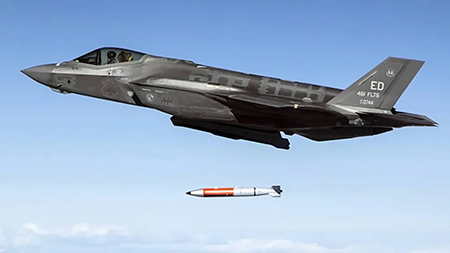"I want to tell you that your fact sheet on the [Missile Technology Control Regime] is very well done and useful for me when I have to speak on MTCR issues."
UK to Purchase F-35As and Join NATO Nuclear Mission
July/August 2025
By Lena Kroepke and Shizuka Kuramitsu
The United Kingdom has announced plans to purchase nuclear-capable jets that will become part of the NATO nuclear mission. This represents an expansion of UK involvement beyond its purely sea-based nuclear force for the first time in this millennium.

The decision, which experts say marks another blow to disarmament, was made in the context of growing European interest in developing independent nuclear deterrence capabilities. It reflects heightened European concerns over Russian nuclear threats and uncertainty over the U.S. security guarantee commitment to NATO members.
On June 24, the UK announced its intent to purchase at least twelve F-35A dual-capable fighter jets, which, in contrast to other F-35 variants, are certified to carry both U.S. B61-12 gravity bombs and conventional weapons. This purchase is part of a previously announced UK plan to procure a total of 138 F-35 jets over the lifetime of a F-35 co-production program involving international partners.
According to a government press release, “[t]he purchase represents the biggest strengthening of the UK’s nuclear posture in a generation. It also reintroduces a nuclear role for the Royal Air Force for the first time since the UK retired its sovereign air-launched nuclear weapons following the end of the Cold War.”
The jets will be located at a Royal Air Force station in Marham, according to the press release. At Marham, UK-designed WE177 gravity bombs were stored until the program was canceled in 1998. Its nuclear storage vaults were deactivated since then, according to Hans Kristensen of the Federation of American Scientists.
The purchase was announced ahead of the 2025 NATO summit in the Hague from June 24 to 25, where NATO members committed to higher defense spending. It will allow the UK to join seven other NATO states in the nonstrategic nuclear strike mission, through dual-capable aircraft.
“These aircraft are central to NATO’s nuclear deterrence mission and are available for nuclear roles at various levels of readiness. In their nuclear role, the aircraft are equipped to carry nuclear weapons in a conflict, and personnel are trained accordingly,” according to the NATO website, which was updated on June 24. In addition to explaining the role of the allies in the conventional forces mission, the website also emphasizes that the United States maintains “control and custody of its nuclear weapons forward deployed in Europe.”
In a June 25 press release, the Royal Air Force said that “Day-to-day, the F-35A will be used in a training role” to “improve pilot training and reduce the amount of time for pilots to reach the front-line squadrons.” It remains uncertain whether the United States will increase the number of nuclear weapons that are forward-deployed in Europe and where B61-12 gravity bombs will be stored.
The decision follows publication June 2 of a new UK Strategic Defense Review that is aimed at strengthening the state’s national security.
The government conducts at least one review per decade to assess the nation’s strategic interests and military requirements, but this year’s version is considered unique because it is “externally led, whereas previous defense reviews have been conducted by the government,” according to the research briefing in the House of Commons Library May 30.
The 2025 review outlined plans to “operate, sustain, and renew” the nation’s nuclear deterrence capabilities to make the UK “secure at home, strong abroad.” Apart from acquiring the F-35 fighter jets, such efforts include an approximately $20.5 billion investment in UK warheads and a $1.4 billion investment in air and missile defenses.
Article I of the 1968 nuclear Nonproliferation Treaty prohibits the five nuclear-weapon states under the treaty—China, France, Russia, the UK, and the United States—from transferring “to any recipient whatsoever nuclear weapons or other nuclear explosive devices or control over such weapons or explosive devices directly, or indirectly; and not in any way to assist, encourage, or induce any non-nuclear-weapon State to manufacture or otherwise acquire nuclear weapons or other nuclear explosive devices, or control over such weapons or explosive devices.”
The International Campaign to Abolish Nuclear Weapons criticized the UK F-35 acquisition in a post on X. “Buying nuclear capable planes from the US to drop the latest US nuclear bombs is a retrograde step from the UK, which gave up its air launched weapons in ‘98,” the advocacy group wrote. “This is also a breach of the legal commitments to pursue nuclear disarmament under the #NPT.”
Europe’s only other nuclear power, France, is also investing in the modernization of its nuclear capabilities. During a visit to the Luxeuil-Saint-Sauveur air base, French President Emannuel Macron announced a $1.7 billion expansion of the air base to host several F-5 fighter jets and ASN4G hypersonic missiles by 2035. Macron also has proposed extending France’s nuclear deterrence umbrella to include other European countries. (See ACT, April 2025.)
Several non-nuclear-weapon European countries have expressed interest in discussing a joint European nuclear deterrence proposal. Although Germany remains determined not to acquire its own nuclear weapons, new German Chancellor Friedrich Merz has emphasized the need to consider nuclear security alliances with France and the UK. Similarly, Polish Prime Minister Donald Tusk highlighted his interest in considering a nuclear alliance with France in his March 7 speech to the Polish parliament. (See ACT, April 2025.)
Regarding European concerns about weakening U.S. security assurances, NATO officials have “dismissed those fears,” according to Defense One. The publication reported June 16 that Jim Stokes, NATO’s director of nuclear policy, told a panel in Prague June 12-14 that the “United States has been extremely clear that there is nothing changing with regard to its nuclear deterrence and its commitment,” and “That includes its posture within Europe … its commitment to the allies, and it’s also about the commitment of our European allies
and Canada.”
